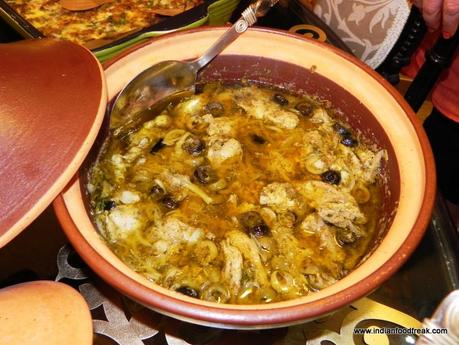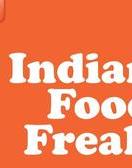
Harissa Couscous
This was a first for me – an African food pop-up. While I had tried Moroccan food often, the rest of Africa remained a mystery. I believe, except for its geographical location in the continent, Moroccan food is way different than rest of Africa because of its influences from the Arabs, Mediterranean and Andalusian cuisines. South African cuisine has had its influences from British, Chinese and Indian cuisines. But Central Africa remains largely uninfluenced. Africa is of course the origin of PeriPeri/PiriPiri chillies and is used often in the dishes. The Portuguese introduced them to the world.
So on a balmy evening a week back we landed at Ananya Banerjee’s beautiful home. Ananya has had a recipe book published called “Planet Gastronomy – 100 Most Popular Global Recipes”. Some of the dishes we tried are also featured in the book.

Harissa Hummus
We started with Harissa Hummus and crackers. Harissa has its origins from Tunisia and is a hot sauce with red chili, bell peppers and garlic flavours. The Harissa Hummus, a twist on the traditional, was a lovely starter. Another starter was the Msmen(also called the Msemen), flaky flat breads that are stuffed with vegetable or meat fillings. These ones were filled with caramelized onions lightly spiced with cumin. They were a wonderful accompaniment tothe Morrocan Mint & Cinnamon Tea. Ananya also demonstrated Splanakopita, a spinach and cheese version of the Burek/Borek. I dare say, to my Indian mind, it looked like a lovely stuffing of spinach, Feta Cheese, garlic and onions in patti samosas. Just goes to show how integral food is to our universal identity.

Bunny Chow
I was waiting for the Bunny Chow eagerly. I had heard about it and there is a sweet little story that goes with it and ties it with India, China and South Africa. During the Great Depression of 1933, food was scarce and it was difficult for the immigrant workers and their British Supervisors to get a good solid meal. In the Indian quarter of Durban there was a vendor who belonged to the grocer community – the Bania, and he sold this meatless curry made from dry sugarcane and beans. Since there were no plates, the immigrants would carve out a hole in the large loaf, put the curry in and eat. The Chow came from the Chinese for whom food means chow. It started off as Bania Chow which then metamorphosed into Bunny Chow. The one we had at Ananya’s was delicious, made with chickpeas, tomatoes and onion.

Bobotie
The mains started with the South African dish called the Bobotie. A version of lamb Shepherd’s Pie flavoured with Mango Chutney and spices with an egg topping; baked to perfection. This was one of the best dishes of the evening. Next was the vegetarian version of Nigerian Jellof Rice. This rice is made during festive occasions usually with chicken or lamb. This bell pepper version did fall a little short on the flavours. The Harissa Couscous on the other hand was soft with every grain separate and bursting with flavours. I had it with Chicken Tagine made with pickled onions and spices. While it was little heavy on the salt, it made up in the rest of the flavours.

Malvo pudding
The dessert was the Dutch influenced South African pudding called the Malvo Pudding. In its traditional form, it is usually made with Cointreau but Ananya had used Benedictine and until I have the real one this will undoubtedly be my favorite dessert!
Ananya does several pop-ups for Oriya, Bengali and Ethiopian food. Her Kasundi and Coriander-Mustard Chutney are outstanding.
Meal for Two without Alcohol: Rs.3000 Approximately | Alcohol: No | Wheelchair access : Yes
Address: Ashok garden. Flat no 102/3, C wing, T. J. Road, Sewree, Mumbai
Telephone : + 919820400222
Disclaimer : This review was done on an invitation. Due judgment and care has been applied by the author to remain objective and unbiased in the review; however readers may exercise their own discretion.






